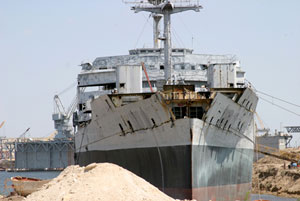NORTH AMERICAN REPORTS
Somebody's Gotta Do It
U.S. shipbuilding's rebirth is being driven by the same environmental pressures that shut down the business in the early 1980s. It returned, but in seamy style.
The Baltimore Sun made that clear in a 1997 Pulitzer Prize- winning investigative series. The U.S. industry, it reported, was "entangled in environmental and worker safety problems, criminal charges, bankruptcies, and lawsuits." Far worse was the hellish shipbreaking landscape in Alang, India, where the Sun spotlighted rampant pollution and labor exploitation. "Some say a worker dies every day," the paper reported. "Nobody keeps track." And who'd supplied many of the Alang ships? America.
The ensuing outrage forced the U.S. government to greatly toughen environmental and worker safety regulations, and enforcement. In 1998, exporting decommissioned ships was banned. The government was left holding a fleet of 170 "ghost ships," which would've been sold to the highest bidder, wherever its location. Storing, maintaining and securing those vessels would cost $58- million from 1999 and 2003.
That scenario illuminated a basic reality: While shipbreaking may well be a dirty business, somebody really does have to do it. Ships are a veritable treasure trove of potent pollutants. Chief among them: asbestos- laden insulation, PCB- coated cables, arsenic, mercury and spent oil. If ships are crudely broken or left to deteriorate, that toxic armada is unleashed.
Paying for Disposal
"We got our first contract from the Navy in 2000," he explains.
 |
| The Neosho, a decommissioned government ship, is shown while being dismantled at ISL's Brownsville operation. |
The SDP ensured U.S. shipbreakers' survival, provided they play by government rules. Only yards certified by the U.S. Maritime Administration (MARAD) as "green" can bid on ghost ships' disposal. They're repeatedly inspected by MARAD, OSHA and state EPAs.
"MARAD requires approved contractors to operate at or above federal and state standards," Donovan noted. All four Brownsville firms are MARAD- certified, as are Chesapeake, Va.- headquartered Bay Bridge Enterprises and Baltimore- based North American Ship Recycling.
Without the SDP, the U.S. business likely would've been eradicated by the industry's dramatic shift from labor- to capital- intensiveness. Environmental and safety regulations now represent about two- thirds of ship- scrapping costs in America.
ISL's environmental equipment, for example, includes HEPA- filtered negative air machines and positive- pressure respirators; protective TYVEK suits; and three- stage decontamination chambers. Employees are intensively trained, with many jobs requiring licensing. Workers get regular physicals and ongoing monitoring of blood lead levels.
Even so, about 90 percent of the world's retired ships still end up at seedy operations in Bangladesh, China, India and Pakistan. Beached ships are stripped on the spot there, frequently by bare hands. A blow torch is usually the most advanced equipment, and safety programs are nonexistent. Pollutants run amok.
Exporting Expertise
"Shipbreaking is one of the most dangerous segments of the maritime industry," OSHA Deputy Assistant Secretary R. Davis Layne noted several years ago. It's still dangerous today, with workers often risking death, injuries and their health. But however imperfect, the U.S. industry is clearly among the world's safety leaders.
ISL, in fact, has formed a new ship- disposal division, Maritime Recycling Consultants, to provide consulting, training, procurement and possible joint- venture opportunities to the European Union (EU). The EU, which has no environmentally compliant disposal facilities, has mandated the retirement of all single- hull petroleum tankers. And EU nations already face a backlog of decommissioned ships.
"Europe is probably 10 years behind the U.S. in dealing with ship disposal," says Donovan, who recently spent two weeks in Geneva talking to the EU Parliament and the United Nations. Predictably, Europeans are struggling with where to site a ship- disposal operation. No EU nation seems to want it.
"Can a dismantling site be found in Europe," asks Donovan, "or might it need to come to another OECD country?"
The EU, he adds, might even consider moving its ship disposal to a U.S. location.

